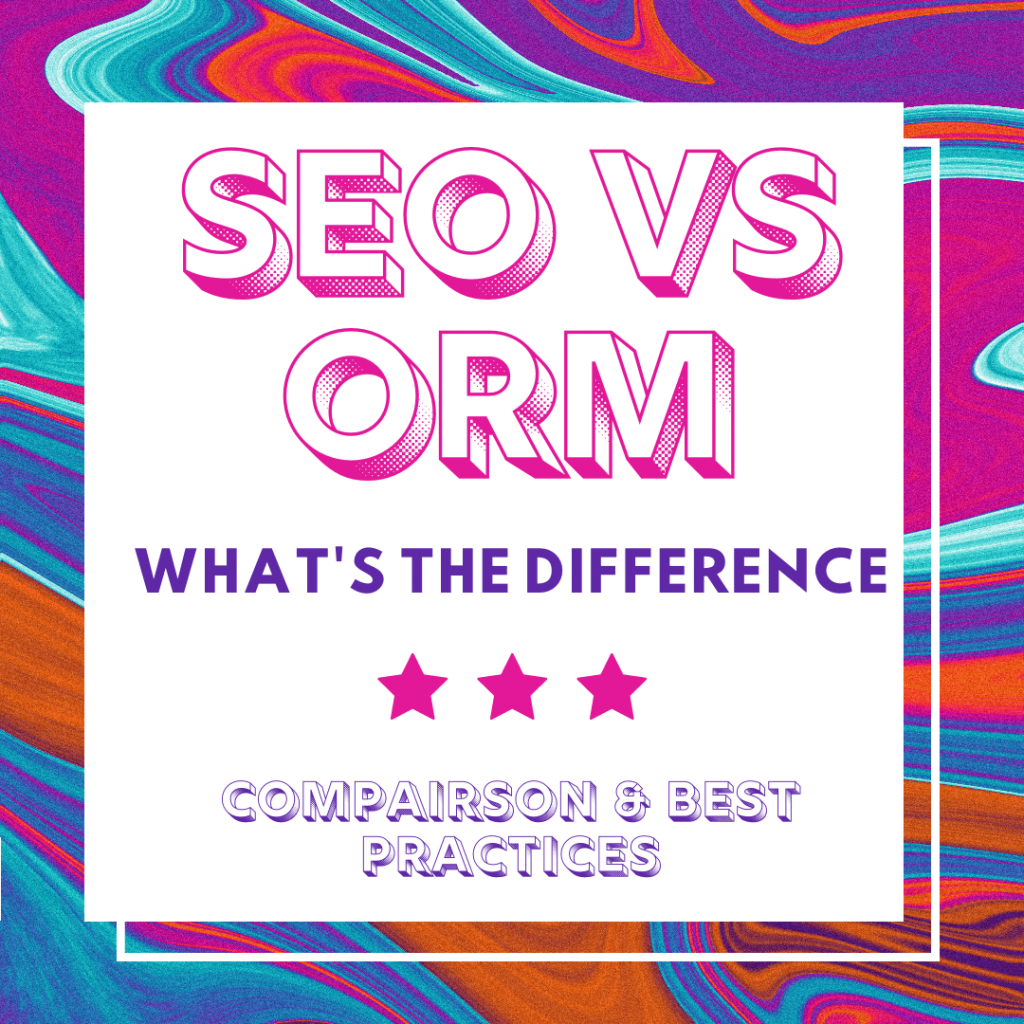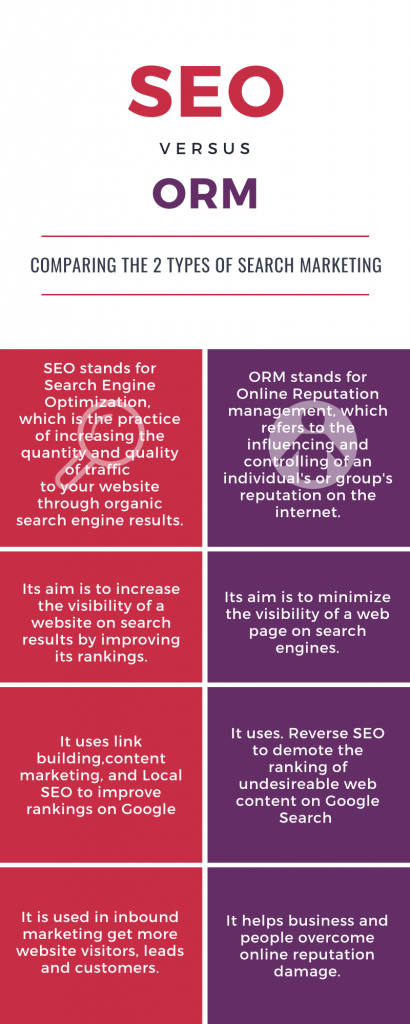Table of Contents
SEO & ORM INFOGRAPHIC
How SEO and ORM Work Together to Build Your Brand
Before the age of the internet, businesses were based on real-life relationships with customers. The local pharmacy was the go-to place for prescriptions and medical advice. You knew your grocer by name, and often an assistant would help carry bags to your car. These days, with the convenience of online shopping, businesses can reach customers anywhere in the world.
But as your audience expands, so does the need to make quality connections with customers. How does one do that over the internet? That's where SEO (search engine optimization) and online reputation management (ORM) come in. Some people may not know the difference, while others think SEO and ORM are one and the same. The truth is, they are neither distinctly separate nor alike - they are two practices that work together as part of a brand's overall marketing strategy.
How Do SEO and ORM Fit into a Successful Digital Marketing Strategy?
SEO and ORM take place at different points in the buyer cycle. The buyer cycle typically goes something like this:
Discovery: A consumer is looking for skincare products within his or her budget. They search on Google, and results include your brand because you use SEO to raise your rankings.
Research: This is the stage where consumers get to know your brand. Do you have the best prices? Does your brand voice match theirs? How does your brand stand out to them amongst others? ORM comes into play here, too (e.g., the types of content you publish will attract buyers and strengthen your reputation).
Decision: Finally, the consumer decides they trust you. Your brand has the best reputation, and they feel satisfied buying from you.
When consumers go online to search for a product, SEO is what helps them find your business. When they try to decide which brand is best for them, ORM is how they get to know your business. SEO puts your business in front of their eyes, and ORM keeps your business in a good place in their minds. As you can see, these two concepts are not mutually exclusive.
What is SEO + Best Practices for SEO
SEO strategies make your business and online content more visible to searchers. This is how you reach a wide audience and get your brand in front of as many people as possible. Essentially, this means getting your content to the top of search results. Most consumers will go with the first handful of results, so it's critical that your business is one of them. SEO accomplishes this by:
- Using the right keywords in the right places. This means using them in headers, title tags, meta descriptions, and a few times throughout the content.
- Creating high-quality content that is entertaining and educational. SEO isn't just about keywords anymore; consumers expect to read valuable content.
- Optimizing your website to load quickly and be easy to navigate. Search engine bots will check your site for load times, broken links, and mobile compatibility. If your site isn't functioning the way it's supposed to, it will be penalized.
Other factors, like your site’s bounce rate (how many people leave right after arriving), the uniqueness of your content, and back-link quality also affect your page rank; therefore, they are a part of SEO.
SEO is the first step in getting your brand out there. It's the foundation of a digital marketing strategy, which all businesses need to stay ahead of the competition. But it doesn't end there.
What is ORM + Best Practices for ORM
Consumers are more and more reliant on businesses with good online reputations. It's not enough to just say you're the best. You have to prove you're the best, too.
Business ORM focuses on the creation of positive, promotional content that leads straight to your business. Content can be published on social media, your company website, or external sites that link back to yours. It does so with one goal in mind: to build your reputation. An ORM strategy might encompass some of the following:
- Finding new channels to publish content, like Facebook, Twitter, Instagram, and other social media networks.
- Becoming a voice of authority by publishing valuable opinion pieces on professional forums like Quora and LinkedIn.
- Linking to other industry authorities with anchor text, and asking others to link to you. The emphasis here is on quality connections.
- Consistently creating positive, engaging content delivered across a variety of channels. The more positive content published, the more negative content is harder to find.
- Actively monitoring your results and resolving problems by removing negative content when possible. For example, responding to bad reviews on Google, asking bloggers (or whoever else created the negative content) to remove blog posts, or commenting with your side of the story.
ORM reflects how you would treat your customers in real life. If a customer came into your store and started complaining in front of others, you would do everything you could to rectify the situation, right? Likewise, you would want residents in your town to know you as the best place for your services or product. ORM services work the same way, but in an intangible space.
So which one should I use? Search Engine Optimization or Online Reputation Management?
By now, you may be wondering what practice you should focus on: SEO or ORM. The answer lies within your business’ current reputation. Run a few Google searches and look at the following:
- Do you appear within the top search results?
- Does clicking on the result bring you to a relevant page with helpful content?
- Are there negative results when you Google your name? What type of content is it?
- Is there very little or no content returned associated with your business?
If your business is struggling to get to the top of search results, you should consider an SEO strategist. If you see a lot of negative results tied to your business name when searching on Google, an ORM strategist will help you create positive content that will negate the bad ones. Or, you may want to use both, which will get your content in front of searchers, and it will get only the good content that you want people to see, in front of them.


